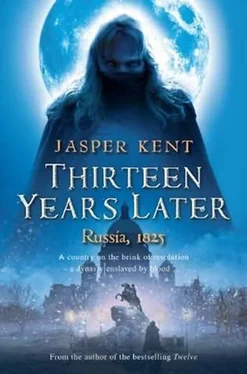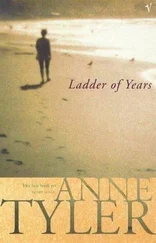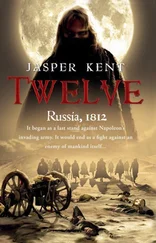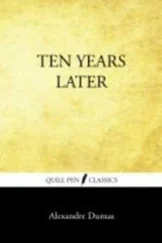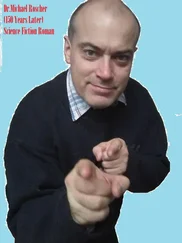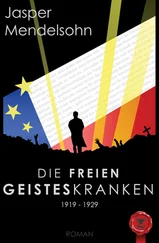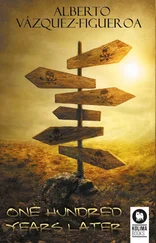‘Thanks,’ said Aleksei. ‘Where are you headed?’
‘To the fortress. Ryleev’s told me to see what can be done about raising the battalion there.’
‘Have you seen Lieutenant Danilov? Dmitry Alekseevich? My son?’ Aleksei realized that his intensity risked frightening the captain.
‘I’m sorry, sir. I haven’t.’
They walked a little way together, then Yekimov headed off to complete his task. When Aleksei reached Admiralty Boulevard he looked west towards Senate Square. Even at this distance, it was clear that a crowd was assembling. Between him and them, outside the Admiralty, stood a group of concerned-looking men on horseback. Aleksei could only guess that they were loyal to the tsar, keeping an eye on how events unfolded. It would not be safe for him to approach the square directly. Instead he slipped north, between the Admiralty and the Winter Palace.
The Neva was a stunning sight – not just because it was a vast, wide, gleaming sheet of ice, but because of the soldiers, converging from all directions on to Senate Square. In the middle of the widest part of the river, opposite the Peter and Paul Fortress, just before the Great and Lesser Nevas split, the crowds separated, avoiding the invisible but potentially deadly weak spot in the centre of the ice. How many hundreds were there altogether? It was impossible to count. There were typically around twelve thousand soldiers stationed in the city in total; both sides would be considering how those would divide. If the split were balanced, it would probably mean a victory for the rebels, as a drift would begin from previously loyal troops. But they were unlikely to get half – how many fewer would still be enough? It was possible that Nikolai had brought in additional troops, but he could not be entirely sure which side they would take.
Aleksei stepped down on to the frozen river. He would far rather have walked along the paved embankment, but that would mean passing close to the Admiralty, where loyal soldiers would be stationed. His fear of them was more rational than his fear of the ice, and so he overcame the latter. The Neva allowed him to give the building a wide berth. It was slippery, though most who crossed seemed to be dealing with it better than Aleksei was. He was reminded of two previous occasions when he had been forced to travel on foot across an icy plane. Both of those had been in battle – once on Lake Satschan, after the Battle of Austerlitz, and then seven years later as the French fled across the Berezina. Then cannonfire, and slightly warmer weather, had meant that the ice was unstable. Today at least, as during every winter in Petersburg, it was as reliable as any other thoroughfare.
His way was eventually blocked by the Isaakievsky Bridge, but it marked the point Aleksei wanted to reach. The pontoon bridge stretched out from Senate Square, across the Great Neva towards the Twelve Colleges on Vasilevskiy Island. With the river frozen, it was impossible to crawl under it, and it would be difficult to climb up on to it, but along the embankment, steps that in summer led up from the water’s edge now led up from the ice. From the river he was too low down to be able to see into the square – all that was visible was the top half of the statue of Pyotr the Great – but he could sense from the murmuring noise that a vast crowd had assembled.
As he ascended the stone steps away from the ice, the whole scene became clear to him. In the background stood Saint Isaac’s, the scaffolding already in place for its planned demolition, but the crowds were keeping well away from there. They were clustered around the statue of Pyotr – an odd choice for rebels in a republican cause, but Aleksei doubted if many truly knew what their leaders had planned for the country. There were over a thousand there, and more flocking in all the time.
Aleksei stood on the quayside, a little way from the crowd, watching. He was about to cross over to the square when a sudden chill came over him – noticeable despite the winter cold. He remembered a story he had heard about what had happened on that very spot, one hundred and thirteen years before. The landscape would have been different then. The embankment would not have been built, and there would have been no statue of Pyotr. Saint Isaac’s was just a church, small compared with the current building and minuscule in comparison with the new one that was planned. The Admiralty would have been there, but nothing like as grand.
In Aleksei’s mind, Pyotr had approached from the east, emerging from the Admiralty. Zmyeevich stood there waiting. Where could Colonel Brodsky and his men have been hiding? How had they been strong enough to subdue a creature like Zmyeevich? It was all the stuff of myth, handed down from generation to generation of the Romanovs and embellished at every step. Could the whole thing have been invention? Nullius in Verba. There was little concrete evidence that there was anything in Aleksandr’s blood. He claimed that he sometimes saw through Zmyeevich’s eyes, but that could be simple hallucination, brought on by the fear of the tales his grandmother had told him. Zmyeevich believed it though – or at least Iuda claimed he did. Zmyeevich had been there – here – so the story went. It may not have happened the way Aleksandr described it, it may not even have happened here, but there had been a meeting between Pyotr and Zmyeevich. And Pyotr had come out on top. If not, why had Yekaterina ensured that his statue, close to that very spot, depicted him trampling a serpent?
Aleksei crossed over to the square and joined the crowd. There seemed little coherent purpose to their presence. They simply stood and waited. Occasionally a shout could be heard: ‘Konstantin ee Konstitutsiya!’ But at whom they were shouting was not clear. Aleksei spoke to the first officer he came to.
‘What regiment are you with?’ he asked.
‘The Moskovsky,’ he said, ‘but there are Grenadiers here too, and some of the Marine Guard.’
‘Who’s in charge?’
‘Bestuzhev led us here, but we’re waiting for Prince Troubetzkoy. He’s going to take charge until Konstantin Pavlovich can be freed.’
‘Freed?’
‘It’s all a lie that he’s abdicated – Bestuzhev told us. They have him in chains in Warsaw on Nikolai’s orders. It’s an outrage. Even the senate’s fallen for it.’
‘They’ve already sworn allegiance to Nikolai?’ asked Aleksei.
‘Apparently. They took the oath at seven this morning. They already left.’
It was almost laughably disorganized. Perhaps Aleksandr had done his brother a favour by bringing on the succession so suddenly. If the rebels had been able to stick with their plans of acting the following year, they would have had more time to prepare. But any comedy that there was would vanish if this crowd continued to grow. Loyal troops would have to do something to disperse it – and that would mean a massacre. But none of that was Aleksei’s immediate concern.
‘Do you know a Lieutenant Danilov?’ he asked. ‘Dmitry Alekseevich.’
The man shook his head. Aleksei moved on through the crowd, asking for Dmitry, but of the few who had even heard of him, none had seen him. It seemed hopeless that he would ever find him; his main hope lay in his son’s height. He would stand out from the crowd, but only by a little.
Over to the east and south, Aleksei could see more troops assembling, many on horseback. There was no indication that they were part of the rebellion – they were here to put it down, and were merely awaiting the order so to do. Aleksei again saw the group of horsemen that he had noticed outside the Admiralty. Now they had been joined by Tsar Nikolai. At that distance it was impossible to see his expression, but on his decision of whether to end the rebellion by persuasion or by force lay the fate of thousands of men.
Читать дальше
